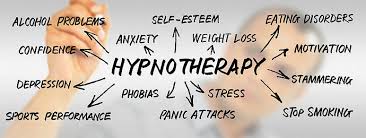 HYPNOTHERAPY Studies have shown that hypnosis can be effective at relieving pain during certain medical procedures. It has also been proven successful at treating children with cancer undergoing painful treatments. Trials have shown that hypnosis can also help relieve pain from gastrointestinal disorders and can even speed the healing of surgical wounds and broken bones. Another benefit, according to Consumer Reports, is that side effects associated with hypnosis are extremely rare and are relatively minor compared to those associated with drugs. In investigations of what types of pain hypnosis is effective and which types are not, most seem to indicate that hypnosis is universally successful in pain management. Hypnosis has been shown effective in management of many varied types of pain, including pain associated with childbirth angioplasty, leukemia, and even headaches. Hypnosis has been used as a psychological treatment for a variety of illnesses with apparent success. While it is unlikely that hypnotic suggestions are capable of curing physical disease, they can be used to enhance relaxation and alleviate pain and other physical discomforts, and therefore they may make a positive contribution to the overall quality of care and of life. For example, several controlled studies have shown that hypnotic suggestions administered to patients who suffer from asthma can reduce both bronchodilators use and attacks of "wheezing", as well as increase peak expiratory flow rates. Hypnosis has also been used effectively in the treatment of irritable bowel syndrome, hyperemesis gravidarum (persistent nausea and vomiting) in pregnant women, and anticipatory nausea experienced by cancer patients who receive chemotherapy. Hypnotic suggestions have been observed to stimulate and inhibit allergic responses and may also speed the healing of burns and wounds. Some of the most common pain and health issues manageable through hypnosis include:
If you’re picturing a stage act led by a man with a swinging watch who gets volunteers to walk like a chicken or bark like a dog, forget that. Clinical hypnosis is a real therapy in which you learn how to use the power of your mind to help make positive changes. And you’re in control. During hypnosis, you’ll focus on relaxation and letting go of distracting thoughts. You may become more open to specific suggestions and goals, such as lowering pain. After your session, your therapist will go over the things that you can do to help you reach those goals. Research shows that medical hypnosis can help with both sudden (acute) and long-term (chronic) pain from cancer, burns and rheumatoid arthritis It may also ease the some anxiety people feel before surgery. Hypnosis is a set of techniques designed to enhance concentration, minimize one's usual distractions, and heighten responsiveness to suggestions to alter one's thoughts, feelings, behavior, or physiological state. Hypnosis is not a type of psychotherapy. It also is not a treatment in and of itself; rather, it is a procedure than can be used to facilitate other types of therapies and treatments. People differ in the degree to which they respond to hypnosis. The key to becoming hypnotized is the extent to which a person is hypnotizable, which is a very reliable and stable individual difference trait that indexes one's openness to hypnotic suggestions. How does hypnosis work? During hypnosis, the conscious part of the brain is temporarily tuned out as a participant focuses on relaxing and letting go of distracting thoughts. By making his/her mind more concentrated and focused, a participant is able to use it more powerfully. A good analogy is that it’s like using a magnifying glass to focus the rays of the sun and make them more powerful. So, what is hypnosis like? When under hypnosis, a person may experience physiologic changes. It’s common for their pulse and respiration to slow down and their alpha brain waves to increase. In this altered state, a person may become more open to specific suggestions and goals offered by the therapist, such as reducing pain. After this suggestion phase, the therapist reinforces continued use of the new behavior or mindset. For everyone, the experience is a little different. Some people describe their experience as a “trance-like” state. Others may experience it as imagery or the soothing of body sensations. Most people describe hypnosis as pleasant, where they feel focused and absorbed in the experience. They tend to have an acute awareness, but also feel relaxed, comfortable and peaceful. Hypnosis techniques for pain management: Hypnosis treatment for pain conditions typically consists of 4 stages:
Another technique being used for decreasing the sensitivity to pain is hypnoanalgesia. The goal here is to use hypnosis in place of an analgesic in hospitals during surgery to reduce nausea, pain, vomiting and the length of hospital stay. What began as somewhat anecdotal, positive results for hypnoanalgesia has now been supplemented by well-controlled experiments. Common myths about hypnosis Hypnosis can’t do everything. There are many myths, misconceptions and misinformation about it – possibly even more than about any other treatment for chronic pain. People have preconceived notions based on stage performers, television and movies and rumors – and these cultural references tend to embellish what it can do. Hypnosis cannot cure everything. It isn’t dangerous. Participants won’t be asked to do anything against their will. (refer to chart below for common myths and their truths) Benefits for pain management
· May be more effective or at least equivalent to other treatments for acute and chronic pain · Have the potential to save both money and time for patients and clinicians, if the patient responds to hypnosis · May be able to provide analgesia, reduce stress, relieve anxiety, improve sleep, improve mood and reduce the need for opioids · Can enhance the efficacy of other well-established treatments for pain When It's Used Since hypnotherapy is an adjunct form of therapy, used along with other forms of psychological or medical treatment, there are many applications. Hypnotherapy can be used to treat anxiety, phobias, substance abuse including tobacco, sexual dysfunction, undesirable spontaneous behaviors, and bad habits. It can be used to help improve sleep, learning disorders, communication, and relationship issues. Hypnotherapy can aid in pain management and help resolve medical conditions such as digestive disorders, skin issues, and gastrointestinal side effects of pregnancy and chemotherapy. It can also be used by dentists to help patients control their fears or to treat teeth grinding and other oral conditions. The subconscious mind is the part of our consciousness that defines who we are and what we do consistently. It makes up our personality. It starts off empty when it is first developed before birth, and then starts gathering information from our experiences and perceptions about what happening around us. This information is held in our permanent memory, which contains all the information that we gather throughout our lives. Some of this information in the subconscious mind can turn into habits and we react automatically to people and circumstances in our lives. This information can also develop into beliefs, which we think are true, even though we may not have definite proof. The subconscious mind resists change, which is usually beneficial by allowing us to conserve a great deal of mental energy. This enables us to maintain a consistent personality throughout our lives, but can cause problems when we decide we need to make a change in how we think, feel, or behave, which are areas in which hypnosis can help. The Subconscious Mind is always working to protect us from what we believe to be dangerous. Emotions are generated when our perceptions about what is going on around us interact with our beliefs about how we think things should be. For example, when the Subconscious Mind perceives what it believes to be a dangerous situation, it generates fear. Another example could be when it perceives that you have been treated unfairly, it will generate anger. Hypnosis can directly affect these beliefs and habits. The conscious mind is where you are right now and where we spend most of our waking time. It basically does only four things. 1) It analyzes. This is the part that looks at problems and what needs to be done to solve those particular problems. It’s also the part that makes hundreds of decisions throughout the day, things like “should I answer the phone?”, “Should I open the door”. Some of these things we think are automatic but we have to make a decision whether to do them. 2) It rationalizes. It gives a reason for everything we do. If we don’t have a reason why we do the things we do, we become anxious, nervous, frustrated. The problem is that we consciously rationalize is often not correct. 3) It houses working memory. This is the memory we need every day. “What’s my phone number?” “What are my kid’s names?” Those are the types of things we need to remember to get through the day. 4) It provides will power. In hypnosis, we relax the conscious mind in order to access the subconscious mind. In hypnosis, we relax the conscious mind in order to access the subconscious mind. Hypnosis is commonly defined as a heightened state of suggestibility, which is usually brought about by means of a hypnotic induction. A more formal definition is that hypnosis is the bypass of the critical factor and the establishment of acceptable selective thinking. Hypnosis can be effective at helping change habits, behaviors, and emotional responses because it works at the subconscious and conscious levels of the mind to create change. Yes, the part of you conscious mind that remembers operates normally in hypnosis. You are not asleep and you are fully conscious in hypnosis. In fact you have heightened attention and are more conscious than normal. All levels of your mind, the conscious, subconscious, and unconscious will be working in sync. The unconscious mind is the consciousness of the body. It is developed before birth and is completely programmed to take care of all of the things that keep the body running smoothly such as breathing, digesting food, and protecting against infections. The unconscious mind can learn. Dr Ivan Pavlov famously demonstrated this with by training dogs to salivate to the sound of a bell when the bell had been paired with a bit of food. The unconscious mind means well, but sometimes will program us to do things that aren’t in our best interests. The unconscious mind can actually generate symptoms like a headache or stomachache to protect us from stressful situations. An example of this is a child who will learn to be sick in order to avoid going to school. In its mission to protect us, it can cause us to desire unhealthy substances if it thinks they will help us relax or cope with stress. Hypnosis can be used to overcome this programming. Are you ready to release all habits that are not for your higher good? Are you ready to reduce pain, stress, anxiety from your life? Whatever it is that you want to eliminate from your life now is the time. Reach out now and begin the life you deserve. www.crystalwater.life [email protected]
1 Comment
|
Photo from ienfp.com


 RSS Feed
RSS Feed